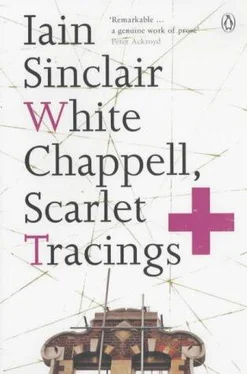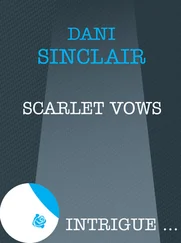A smell of violets, left too long in water.
Gull wiped the glass clean with the back of his sleeve. The outline of his hand, framed in a shield, remaining. A trowel of earth.
‘The days of the Antichrist are come. Know now that I am appointed time’s abortionist.’
Midsummer: the shortest night. The year on its side. Joblard is to marry. To make that act, that avowal: St Bartholomew-the-Great. The Chemical Wedding, sponsus and sponsa , merging in song, twisting around the columns of that stone forest; celebrated here in the blending of russian stout, nigredo , with dry blackthorn cider. The risks crowd us, cackle; magpies at the window.
Birds spin into hats, they disguise themselves. We suffer the resilience of the silver-workers, lion spirited, boisterous, loud upon pavements: the Hat & Feathers, corner of Goswell and Clerkenwell Roads. Broad challenging frontage, fresh paint and pillars of red Peterhead granite, gravestone.
Naturally, we do not talk of these things, the things ahead. Does the unspoken, for the first time, put a tremor in Joblard’s hand? Hardly. Rolling a cigarette, damaged finger in a leather stall.
Pints first, begin slowly. Change on the table-top. Joblard running three coins between his fingers. Blackmail the ferryman. Ungrounded bribes. Don’t say it! Take all the time because there is so much coming at a rush, more than the short night will hold.
Without preamble, I plunge.
‘Accepting the notion of “presence” — I mean that certain fictions, chiefly Conan Doyle, Stevenson, but many others also, laid out a template that was more powerful than any local documentary account — the presences that they created, or “figures” if you prefer it, like Rabbi Loew’s Golem, became too much and too fast to be contained within the conventional limits of that fiction. They got out into the stream of time, the ether; they escaped into the labyrinth. They achieved an independent existence.
‘The writers were mediums; they articulated, they gave a shape to some pattern of energy that was already present. They got in on the curve of time, so that by writing, by holding off the inhibiting reflex of the rational mind, they were able to propose a text that was prophetic.
‘Doyle encodes the coming sacrifices, Stevenson’s Jekyll & Hyde , in that predetermined calvinist language, describes what is almost at hand — the escape of the other, the necessary annihilation of self. The Whitechapel Golem, unsouled. There were so many figures, conjured essences, loose among the traps — unfocused, undirected. I don’t know whether they reported them or created them.’
I fumble for a notebook. Not sure if I’ve lost it. The urge towards saying; knowing that what is said is false, thickens the line of truth. The ill-shaped sentence bruises the past. I need a quote from Francis Crick.
‘“ If, for long periods of time, one could prevent the two sections of the brain communicating with each other, one could perhaps convince one brain that it was in the same body as another brain — in other words, one could make two people where there was one before. An area of research that is likely to lead to interesting consequences.”’
‘Hymie Beaker,’ Joblard replied, sliding across the first chaser.
‘Also,’ I couldn’t stop now, ‘on Radio 4, February 19, 1969, he predicted the creation of man/animal hybrids.’
‘Too late. We’ve already got those,’ said Joblard, as his mate Jack hovered over us. ‘The Third Man: part musician, part crocodile.’
Jack presents himself, initially, as an alien life-form. The light from the streetdoor shines through his grey raincape. Beads of sweat trickle down his scalp. His thick glasses are misted over: he is eyeless. His arms are lost within the wings of the cape.
Jack grinned at us: not extinct, obsolete.
But he was so amiable, so lacking in nervous speedy aggression of manner, that I was forced to assume a terrible stubborn fury beneath. Jack made no imposition, needed to assert nothing. More than any human I had met he obeyed Nietzsche’s gnomic instruction: ‘Become what you are.’
Strong-throated, Jack cleared his glass; listened. A vital witness, neutralising the possible escape of the third side, the necessary stranger, always present when two men are talking. Jack sealed the triad. A new benevolence.
I truly believe that if we could have kept him we could have changed fate. The sacrifices would have been annulled. The shriek in the night, by this addition, earthed.
But the fret is on, it’s compulsive. One of those times when it has to be said.
‘Rimbaud, Verlaine. Went over the ground. Verlaine said, “ As for London, we have explored it long ago… Whitechapel… Angel, the City… had no mysteries for us. ” He said that the City had “ the atmosphere of a machine-shop, or the interior of a heart. All the heroes are to be found there. ”
‘And this is simply the truth. They are there as guides — the poets born and dying at the old gates of the City.
‘Chaucer, Keats; Milton, born at the sign of The Spread Eagle , his father had another house, The Rose . And they are there in the stone effigies, the Moloch façades. It’s the most darkly encoded enclosure in the western world. Bad magic, preconscious voodoo.
‘Rimbaud and Verlaine were, at that time, the great time for them, the time of their time, into that inhuman sex heat coupling, “total derangement”, that was occult in intention as well as effect; the will of Rimbaud and the compliant sacrifice of Verlaine, reversing and twisting, exchanging, animus and anima , reading each other’s dreams, spine snake dramas, double-helix, pain. The black acts. Like Crowley and Victor Neuberg in their talentless variant. “ They were full of eyes within .”’
The evening was rancid now, our glasses slid in pools of sweat across the table. Our arms stuck to the chairs, which creaked as we moved; faked pornographic sighs.
‘I can feel the fucking going on,’ said Joblard, with relish. ‘Does it take two to occult fuck? Or more?’
Jack groaned. I drove on, undiverted.
‘Verlaine saw it, but didn’t do it. He projected a “ ferocious novel, as sadistic as possible, written in a very terse style ”. But couldn’t carry it off; gone, swallowed, finished, back to the domestic teat, hungry ghost begging for absolution in the skirts of the church, breathing old farts.
‘From these acts only one man emerges. The other is eliminated, engorged. Verlaine was bloodless, sucked dry as paper. He was wholly necessary, an equal partner, but he never emerged from that room. What he had went over.
‘Rimbaud was reading, British Museum, diving into Poe, into magical primers. He claimed that writers are “ the mirrors of gigantic shadows which futurity casts upon the present ”.
‘That’s it exactly. “ In everything any man wrote… is contained … the allegorical idea of his own future life, as the acorn contains the oak .” Yes!
‘They were pulsing, they were open. They roamed, every day, out along the river, into Whitechapel, Wapping, Ratcliff, Limehouse. Entering wilfully into that fiction.
‘Rimbaud’s occult awareness was so intense, he was burning his own time so recklessly, all or nothing, that he described more fiercely than any other man, then or now, the elements of the Whitechapel millennial sacrifice. And by describing, caused them. They were said. They had to be.’
Jack cast a baleful eye on the notebook, but at that moment he would rather drink than talk. The light was with us, doors open to the street, smoke and feathers.
Читать дальше












